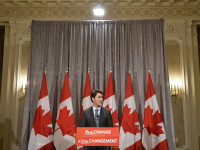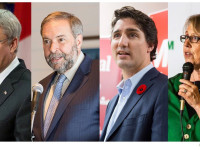Digital policies may not have played a significant role in the just-concluded national election, but the arrival of a majority Liberal government will leave many expecting “real change” on the digital front in the years ahead. My weekly technology law column (Toronto Star version, homepage version) notes that Prime Minister-designate Justin Trudeau is likely to focus on key economic promises from his platform once Parliament resumes. However, there will be several digital issues that should command attention during his first 12 months in office.
Columns
The Rise and Fall of the Conservatives’ Digital Policy
As Canadians head to the polls, Internet and digital issues are unlikely to be top-of-mind for many voters. Each party has sprinkled its election platform with digital policies – the NDP emphasizes privacy, net neutrality and its opposition to the Trans Pacific Partnership, the Liberals focus on open government, and the Conservatives tout cyber-security – yet Internet and digital issues have played at best a minor role in the campaign. The early references to a Netflix tax or the debate over Bill C-51 have been largely lost in an election whose central issue seems primarily to be a referendum on ten years of Stephen Harper and the Conservative government.
My weekly technology law column (Toronto Star version, homepage version) notes that a review of digital and Internet law in the 2015 election campaign involves a similar assessment on the past decade of privacy, copyright and telecom policy. The Conservatives once placed a heavy emphasis on Internet-friendly approach, crafting rules that were designed to attract popular support by encouraging telecom competition, greater flexibility for copyright, and consumer privacy protection. Yet toward the end of its mandate, the government shifted priorities and in the process seemed to forget about the Internet.
How the TPP Puts Canadian Privacy at Risk
The Trans Pacific Partnership (TPP), a massive trade agreement that covers nearly 40 per cent of world GDP, wrapped up years of negotiation earlier this month. The TPP immediately emerged as an election issue, with the Conservatives trumpeting the deal as a source of future economic growth, the Liberals adopting a wait-and-see approach (the specific details of the agreement are still not public), and the NDP voicing strong opposition.
The focal point of most TPP discussion in Canada has centered on two sectors: the dairy industry, who would experience a modest increase in competition and receive a staggering multi-billion dollar compensation package, and the automotive parts sector, which would face Asian-based competition as a result of new, lower local content requirements (the industry is also pressing for a compensation package).
My weekly technology law column (Toronto Star version, homepage version) notes that lost in the discussion over imported butter and Japanese-made auto parts are the broader implications of the TPP. New rules on corporate lawsuits could result in more claims by foreign corporations against the Canadian government over national policies or court decisions (pharmaceutical giant Eli Lilly is already suing the government for $500 million over Canadian patent rulings) and an extension in the term of copyright beyond the international standard would lock down the public domain for decades and potentially cost Canadians hundreds of millions of dollars per year.
CBC Shoots Itself in the Foot With Election Debate Coverage
Hubert Lacroix, the president of the CBC, recently placed the future of the Canada’s national public broadcaster on the electoral map with comments aimed sparking a renewed debate on future funding models. Lacroix disputed claims that low ratings are to blame for the CBC’s financial struggles, instead pointing to the need to consider alternative fee schemes, including new levies on Internet providers or supplementary charges on television purchases.
While disagreement over CBC funding is as old as the broadcaster itself, the more uncomfortable discussion for the CBC is its coverage of the current election campaign – particularly its approach to national debates and political party advertising – which raises troubling questions about its relevance in the current media environment.
My weekly technology law column (Toronto Star version, homepage version) suggests that most would agree that the CBC features an excellent group of reporters and boasts insightful analysts for its panel discussions. However, rather than working to make itself an invaluable resource for the election, the CBC has been unnecessarily restrictive in its broadcasting choices and in the use of its content.
Why Universal, Affordable Internet Access Should be 2015 Election Campaign Issue
The long election campaign of 2015 has featured a myriad of daily policy announcements as the three largest political parties vie for attention and votes. From targeted tax cuts to new spending promises, political leaders have focused on education, child care, defence, the environment and more. Yet thus far largely missing from the campaign has been the most fundamental digital issue – universal, affordable broadband Internet access.
My weekly technology law column (Toronto Star version, homepage version) notes that the Conservatives pointed to their spending on broadband in August when few were paying much attention, but that policy has done little to stem Canada’s steady slide in the global broadband rankings which indicate that Canadian Internet services are middling at best when compared to other developed countries. The opposition parties have said even less, failing to take advantage of consumer frustration by unveiling innovative policies that might address the issue.











